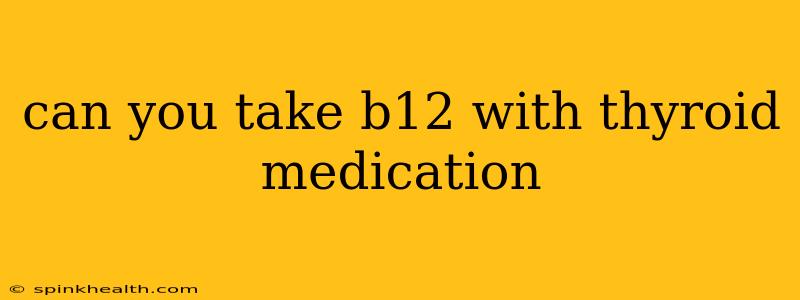Can You Take B12 with Thyroid Medication? Navigating the Supplement-Medication Maze
The question of whether you can take B12 with thyroid medication is a common one, often sparking anxiety for those managing their thyroid health. The short answer is: generally, yes, but with some important caveats. This isn't a simple yes or no, and understanding the nuances is key to managing your overall health effectively. Let's unravel this together.
My name is Amelia, and I've spent years researching and writing about holistic health and wellness, including the intricate interplay between supplements and prescription medications. This post aims to provide clarity and address common concerns around B12 and thyroid medication.
Understanding the Potential Interaction
There's no direct, clinically significant interaction between vitamin B12 and most common thyroid medications like levothyroxine (Synthroid, Levothroid) or liothyronine (Cytomel, Triostat). This means that B12 doesn't typically interfere with the absorption or effectiveness of your thyroid medication.
However, the reason you might be considering B12 supplementation is often linked to underlying health issues that could indirectly affect your thyroid health. This is where things get a little more complex.
Why Are You Taking B12? The Underlying Health Picture
Many people take B12 supplements due to:
-
Vitamin B12 Deficiency: This is incredibly common, especially among older adults and vegans/vegetarians. A deficiency can manifest in various ways, including fatigue, weakness, and neurological problems – symptoms which can also be associated with hypothyroidism (an underactive thyroid).
-
Underlying Health Conditions: Certain conditions, such as pernicious anemia (an autoimmune disorder affecting B12 absorption), can both lead to B12 deficiency and increase the risk of thyroid issues.
-
Improved Energy and Metabolism: B12 plays a crucial role in energy production and metabolism, areas often affected by thyroid dysfunction. People with thyroid problems may seek B12 to improve energy levels.
Does B12 Affect Thyroid Medication Absorption?
The simple answer is no. There is no significant scientific evidence suggesting B12 affects the absorption of levothyroxine or liothyronine. However, timing can still be important, especially for optimal absorption of your thyroid medication. This is why your doctor will provide specific instructions for when and how to take it.
Should I Take B12 and Thyroid Medication at the Same Time?
While there's no known interaction, it’s always best to separate the intake of your B12 supplement and thyroid medication by at least 30-60 minutes. This helps avoid any potential unforeseen issues. Take your thyroid medication as prescribed by your doctor, and take your B12 supplement at a different time.
What If I Experience Side Effects?
Even though there's no direct interaction, listen to your body. If you experience any unusual side effects after starting B12, such as increased anxiety, palpitations, or digestive upset, consult your doctor immediately. Keeping a detailed log of what you're taking and when can be beneficial.
The Importance of Communication with Your Doctor
This information is for general knowledge and does not constitute medical advice. It's crucial to discuss any supplements you're considering, including B12, with your doctor or endocrinologist, especially if you're on thyroid medication. They can help determine if a B12 supplement is appropriate for you and advise on the optimal dosage and timing to ensure your overall health and well-being.
By understanding the relationship (or lack thereof) between B12 and thyroid medication and by maintaining open communication with your healthcare provider, you can effectively manage your health and achieve a better quality of life. Remember, proactive communication is key to successful health management.

